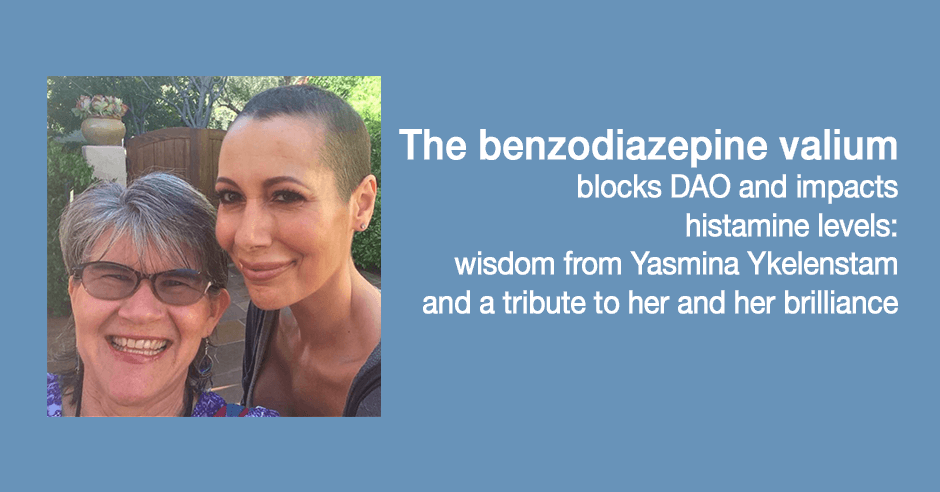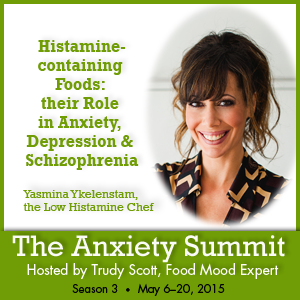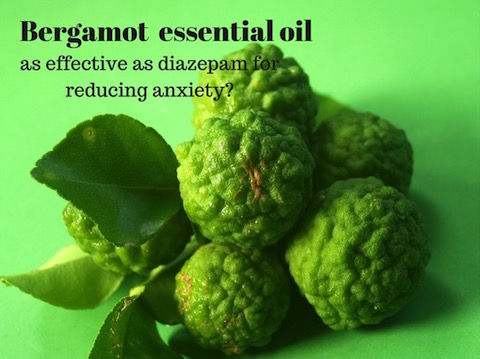
The benzodiazepine valium blocks DAO and impacts histamine levels and may actually increase anxiety via this mechanism. I learned all this in an interview I conducted with my amazing colleague Yasmina Ykelenstam.
Sadly Yasmina lost her battle to a rare and aggressive type of breast cancer this week. She had triple negative breast cancer which has a minimal survival rate of no longer than just a few months. She lived with it for over 2 years, outliving all odds. She had just turned 43.
It is with great sadness and reflection that I write this post as tribute to Yasmina who was as bold as she was brilliant.
Yasmina is well known as the Low Histamine Chef and for an abundance of histamine intolerance resources and recipes on Healing Histamine.
We only met in person on one occasion in 2017 and spent an evening and wonderful lunch together. Her warmth, passion and caring shone through and I felt I already knew this kind and smart woman. I had been following her work online after an interview with Dr. Ben Lynch on season 2 of the Anxiety Summit – Biochemical and genetic predispositions: COMT, GAD & MAOA – where he raved about her work.
I reached out to Yasmina and was so thrilled to have the opportunity to interview her for season 3 of the Anxiety Summit – Histamine-containing Foods: their Role in Anxiety, Depression and Schizophrenia
As a tribute to Yasmina and so her brilliance continues to shine I’m sharing some of the highlights from our interview, where she shared that:
- Histamine is the gluten of the intolerance world
- Histamine is a neurotransmitter and plays a role in mood disorders
- Histamine can cause symptoms of anxiety: Increased heart rate and blood pressure, shortness of breath and gasping for air, pounding heart, dizziness and feeling faint
In case you’re new to histamine intolerance this paper provides a quick overview: Histamine and histamine intolerance
Histamine intolerance results from a disequilibrium of accumulated histamine and the capacity for histamine degradation. Histamine is a biogenic amine that occurs to various degrees in many foods. In healthy persons, dietary histamine can be rapidly detoxified by amine oxidases, whereas persons with low amine oxidase activity are at risk of histamine toxicity. Diamine oxidase (DAO) is the main enzyme for the metabolism of ingested histamine.
This new research shows how a low histamine diet has benefits: Histamine-reduced diet and increase of serum diamine oxidase correlating to diet compliance in histamine intolerance
In our interview we had a lengthy discussion on benzodiazapines and the histamine connection. It was both fascinating and very concerning:
Many people doing a benzodiazepine taper are often switched to Valium which is a DAO [diamine oxidase blocker (or histamine liberator)] and this further prevents histamine from being removed from the body.
Dye are also triggers…the pink Xanax can be problematic
Here is the transcript from the benzodiazepine section of our interview, with a few tweaks to give it context. I start by asking Yasmina to talk about histamine interactions with psychiatric medications.
* * * * * * * * * * * * * * * * * * *
Yasmina Ykelenstam: Well, I recommend that people go to a wonderful website and it is called histaminintoleranz.ch. It’s German, but it’s translated into English. That’s H‑I‑S‑T‑A‑M‑I‑N‑I‑N‑T‑O‑L‑E‑R‑A‑N‑Z.ch. And they have a very, very long list of medications on there that interact with diamine oxidase or histamine liberators. The one that I just wanted to mention very quickly because it’s relevant to anxiety – and that one is diazepam [you can find this listed on the above site on this page.]
Diazepam (or Valium) is a medicine, as I said, that I used when I was a child – for a couple of days. And it’s a tranquilizer, a benzodiazepine. One of the most commonly prescribed benzodiazepines in the world is Valium.
I don’t know if it still is, but when the UN would send out emergency packs to people, Valium was included in there. That’s how widespread its use is. It’s a diamine oxidase blocker. So it blocks the enzyme responsible for degrading histamine in the body. So people who are dealing with anxiety symptoms that are perhaps caused by histamine issues would not do very well potentially with Valium / diazepam because it would further prevent histamine from being removed from the body.
I was on Valium / diazepam for many, many years after it was first prescribed to me and I did not know that. And it was the medicine, it was the tranquilizer that I chose to use to taper from another benzo. I was on Xanax at the time and I had been told that Xanax is harder to withdraw from than crack. So I should switch to another benzodiazepine that had a longer half-life – how long it stays in the body – so that it would make it easier for me to withdraw. And Valium / diazepam was the one that I chose and I think that’s when my body started giving me the message of “Hurry up; just finish this; just cut, cut, cut; get this out of the body because it’s not doing you any good.”
But there is a very, very long list of medications on that German site and interestingly, there are a number of antihistamines in the list of medications that block diamine oxidase and also the other histamine-degrading enzyme. Cimetidine, C‑I‑M‑E‑T‑I‑D‑I‑N-E – I think it is a second-generation antihistamine. It is still prescribed today. It was being prescribed to many people by a doctor in London.
I have another doctor: Dr. Seneviratne in London. He is an immunologist with mast cell focus. He’s excellent. But there was another doctor who was supposedly a mast cell person who was prescribing cimetidine to people. I had to send a message to him saying please stop doing this because it’s probably not very good for them. Also, we were talking about diphenhydramine and that is an HNMT blocker, which is the other histamine‑degrading enzyme.
Trudy Scott: Okay. So I want to just recap here. So we’ve got these meds that block the DAO enzyme, which in turn prevents you from releasing histamine and preventing histamine from being removed from the body.
Yasmina Ykelenstam: Exactly. Yeah, and what’s odd is diphenhydramine is obviously Benadryl, which is one of the most commonly prescribed antihistamines in the United States.
Trudy Scott: A lot of people are on diphenhydramine. You’re right, yeah.
Yasmina Ykelenstam: There are many different mechanisms of action for degrading histamine and for getting it out of the body. So it might not be the end of the world if you’re taking one medication that affects the DAO enzyme but doesn’t affect the HNMT enzyme. And obviously, there’s the liver and there’s different methods of dealing with things in the body. So it’s not the end of the world, but still it’s something you might not want to do and should definitely discuss with your doctor.
Trudy Scott: Yes, and being aware of this. Now I wanted to just go back to the benzodiazepines because I was not aware of this connection to Valium diazepam, and that being a DAO blocker. So is it only the Valium and the other benzodiazepines are not, or is it all benzodiazepines?
Yasmina Ykelenstam: Okay, let me try to remember. Haloperidol is an antipsychotic, isn’t it? (It’s on the list)
Trudy Scott: Yes, that’s correct.
Yasmina Ykelenstam: I am not aware of any others offhand and I’m just trying to take a quick look at the list now that I have it in front of me. But no, I don’t believe so because I looked them up because having taken all of them, and I mean, really all of them, I have taken every benzodiazepine ever made in the last 30 years. And no, I think it was just the diazepam, but as I said, it is one of the most commonly prescribed.
Trudy Scott: And it’s really important for me to mention this because I am dead against all benzodiazepines because of their addictive/dependent nature and the side effects and when you’re trying to taper off they cause all these problems. I’ve interviewed a number of people on this topic. In Season 1 of the Anxiety Summit, I interviewed Dr. Catherine Pittman who talked about the Benzobuddies.org group and how so many individuals battle getting off benzodiazepines.
Yasmina Ykelenstam: Oh, I was a member.
Trudy Scott: You were?
Yasmina Ykelenstam: I was a member there (at benzobuddies.org) at one point.
Trudy Scott: Oh, you were? Yeah, it’s a very big issue and problematic drug. But why I’m saying this is because Professor Ashton, who’s an expert on tapering, talks about switching to Valium. So this could be problematic.
Yasmina Ykelenstam: Well, if you could reach out to these communities, that would be fantastic because I did spend some time after, figuring out what was going on, trying to contact people and trying to let them know of this link because there were a lot of people that were in these communities that were suffering from protracted withdrawals. And by this point, I had my suspicions that the protracted withdrawals were actually a histamine response and that the reason that they were experiencing this was just that the original issue was never dealt with. And that was that it might be an underlying histamine issue that initially had them diagnosed with the anxiety disorder and then they were taking these meds. And so when you take the medication away, you’re still left with the existing condition but it isn’t being addressed.
Trudy Scott: Yes, and maybe some of them had done the switch to Valium, which was making things worse.
Yasmina Ykelenstam: Exactly.
Trudy Scott: Very interesting.
Yasmina Ykelenstam: The reason I switched to Valium was because I was following Dr. Ashton’s protocol from benzo.org.uk. I was advised against coming off my medication and I was told that there was no safe withdrawal protocol. I brought them a copy of the Ashton protocol and I was laughed out of the office, but I chose to do it on my own anyway and I’m very grateful to her research.
Trudy Scott: Yes, she’s done amazing research. I’m so appreciative to learn of this component and I’m on a mission to educate people about the benzodiazepines and this is just another aspect that we need to be considering. I will certainly reach out to some of these groups and people hearing this on this Summit, is going to bring awareness to this aspect. All of this is fantastic.
Yasmina Ykelenstam: The other brief thing is that, of course, the dyes are also triggers. And this is why a lot of us, when we’re prescribed psychiatric meds, end up with a new set of symptoms because of the coloring that is actually on the tablets. I was unable to take the pink Xanax, but I was able to take the white Xanax, and my doctor never understood it. He said, “I don’t understand how higher doses of Xanax make you feel worse, but the lower ones works for you.” And I kept telling him, “But I’m taking the same dose at the end of the day, so I don’t understand either.”
* * * * * * * * * * * * * * * * * * *
Here is the link to the entire audio so you can get a better understanding of histamine intolerance.
I’d love to hear your benzodiazepine and histamine intolerance experiences – both good and bad
It would remiss of me to omit something that is seldom discussed: the link between benzodiazepine use and increased cancer risk. In our interview Yasmina shared this “I have taken every benzodiazepine ever made in the last 30 years.”
Yasmina was always very open about her healing journey and I suspect she asked herself this question and would be ok with me making this possible connection in the hope it may help someone who is considering a starting a benzodiazepine prescription or someone contemplating doing a benzodiazepine taper.
I hope this has been helpful if you’re currently taking a benzodiazepine, are considering taking one, have taken one in the past, have issues with high histamine foods, are taking one of the other medications on the list, and/or have had issues with the colors in medications.
With much appreciation to Yasmina! We loved her and thank her for sharing so freely and wisely and we love that her wisdom will live on! Rest in peace. My deepest sympathies to her family and others who were close to her.
Note added later on 9/14/18 after this blog was published:
As soon as I heard the sad news about Yasmina I wrote this blog as a tribute to her. Then a few hours before it was due to be published I heard her family had not yet made the announcement public and hadn’t yet shared the news with her community. At the last minute I removed the tribute sections out of respect for them. When I woke I saw the announcement on her Facebook page and reinstated my tribute.
I’ll be doing further updates to share some of what was said about continuing her legacy and anything more I learn.


